NATO Military Committee
The North Atlantic Treaty Organisation Military Committee (NATO MC) is the body of NATO that is composed of member states' Chiefs of Defence (CHOD). These national CHODs are regularly represented in the MC by their permanent Military Representatives (MilRep), who often are two- or three-star flag officers. Like the Council, from time to time the Military Committee also meets at a higher level, namely at the level of Chiefs of Defence, the most senior military officer in each nation's armed forces.
| NATO Military Committee | |
|---|---|
| Allegiance | |
| Location | Brussels, Belgium |
| Website | NATO.int |
| Commanders | |
| Secretary General | Jens Stoltenberg |
| Chairman | Air Chief Marshal Sir Stuart Peach |
| Deputy Chairman | Lieutenant General Scott Kindsvater |
| Director General of the International Military Staff | Lieutenant General Hans-Werner Wiermann |
| Insignia | |
| Chairman's arms | 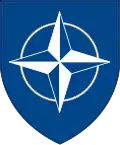 |
| Deputy Chairman's arms | 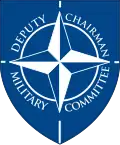 |
| International Military Staff's arms | 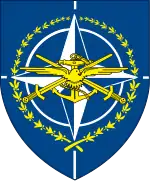 |
| International Military Staff's flag | 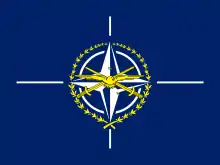 |
Role
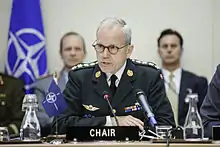
The MC assists and advises the North Atlantic Council (NAC), Defence Planning Committee, and Nuclear Planning Group on military matters including policy and strategy.[1] Its principal role is to provide direction and advice on military policy and strategy. It provides guidance on military matters to the NATO Strategic Commanders, whose representatives attend its meetings, and is responsible for the overall conduct of the military affairs of the Alliance under the authority of the Council. The executive body of the MC is the International Military Staff (IMS).[2] The NATO Military Command Structure consists of two strategic commands and is directed by the International Military Staff:[3]
The commands under SACEUR - Allied Joint Force Command Brunssum, Allied Joint Force Command Naples and Joint Force Command Norfolk are Operational Level Commands, while Headquarters Allied Air Command, Headquarters Allied Maritime Command and Headquarters Allied Land Command are Tactical Level Commands.[4] SACEUR also has operational command of the Joint Support and Enabling Command.[5]
- Liaison: Provides advice and support to the NAC
| Political strategic level: | |||||||||||||||||||
| NA Council | |||||||||||||||||||
| NATO SG Brussels, BE | IS Brussels, BE | ||||||||||||||||||
| Military strategic level: | |||||||||||||||||||
CMC (NATO MC) | |||||||||||||||||||
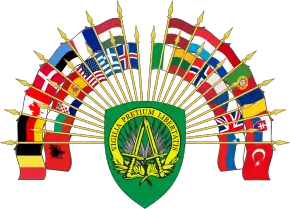 SACEUR (ACO, SHAPE) Mons, BE | 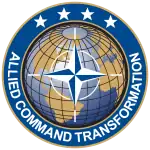 SACT (ACT, HQ SACT) Norfolk, US | ||||||||||||||||||
| Operational level: | |||||||||||||||||||
| JFC-NF Norfolk, Virginia, US | |||||||||||||||||||
History
Until 2008 the Military Committee excluded France, due to that country's 1966 decision to remove itself from NATO's integrated military structure, which it rejoined in 1995. Until France rejoined NATO, it was not represented on the Defence Planning Committee, and this led to conflicts between it and NATO members. Such was the case in the lead up to Operation Iraqi Freedom.[6]
Established in 1949 during the first Council session in Washington, the Military Committee is NATO's highest military authority and advises the NAC and NATO's strategic commanders, the Supreme Allied Commander Transformation and the Supreme Allied Commander Europe.[7]
- Arms of historical NATO commands

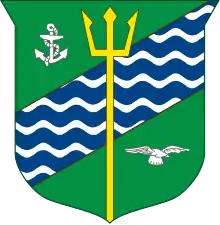
.svg.png.webp)
See also
References
- NATO Handbook, 50th Anniversary Edition, 1998-99, 234.
- International Military Staff, Jun 15, 2017, retrieved Feb 20, 2018.
- "Command Structure" (PDF). NATO. Retrieved 19 October 2019. and "Military Command Structure". shape.nato.int. Supreme Head Allied Powers Europe. 12 February 2020. Retrieved 12 February 2020.
- "MILITARY COMMAND STRUCTURE". shape.nato.int. NATO. 7 October 2020. Retrieved 7 October 2020.
- Boeke, Sergei (13 January 2020). "Creating a secure and functional rear area : NATO's new JSEC Headquarters". nato.int. NATO. Retrieved 9 October 2020.
JSEC is part of the NATO Force Structure and under the operational command of the Supreme Allied Commander Europe (SACEUR).
- Fuller, Thomas (18 February 2003). "Reaching accord, EU warns Saddam of his 'last chance'". International Herald Tribune. Archived from the original on 12 October 2007. Retrieved 15 July 2007.
- https://www.nato.int/cps/en/natolive/topics_49633.htm, NATO Military Committee, Dec 7, 2017, retrieved Feb 15, 2018.